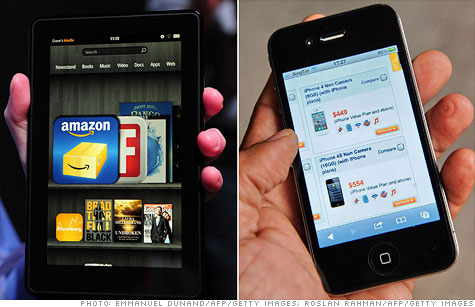
After shelling out at least $199 for an iPhone 4S, some Apple lovers turned to the cheaper Amazon Kindle Fire instead of the iPad.
NEW YORK (CNNMoney) -- Amazon set out to win the tablet market by beating Apple the way no one else could: pricing the Kindle Fire at just $199.
That tactic has paid off -- and it forced Apple to accidentally handicap itself, according to a report from IHS iSuppli.
The firm's analysis found that Apple's (AAPL, Fortune 500) share of the tablet market slipped in the fourth quarter, and IHS iSuppli blames that on the October release of the iPhone 4S. After shelling out at least $199 for a smartphone, not all Apple lovers were willing to spend another $499 on a tablet.
As IHS iSuppli's tablet analyst, Rhoda Alexander, put it: "Many loyal Apple customers devoted their dollars to shiny new alternatives."
IHS iSuppli estimates that Apple shipped a record 15.4 million iPads in the fourth quarter of 2011. That's almost 40% more units than Apple shipped in the previous three-month stretch.
But overall, Amazon was able to eat a bit of Apple's market share. Apple's iPads comprised 57% of the tablet market worldwide last quarter, down from 64% in the third quarter, by IHS's calculations.
Amazon (AMZN, Fortune 500) shipped an estimated 3.8 million Kindle Fires last quarter. That gives it a 14.3% share of the tablet market.
Pricing the Kindle Fire tablet at just $199 won't net Amazon a wide profit margin, but the company is willing to get tablets into customers' hands for cheap. Amazon is banking on making money by selling content like e-books, apps, videos and digital music.
Alexander called that method a "business gamble," and noted that the Kindle Fire's success hinges on the viability of those content sales.
Pure hardware players don't have that option, and customers who are willing to shell out $499 or more overwhelmingly choose the iPad. Sales of the Motorola (MMI) Xoom and Samsung Galaxy Tab have disappointed as a result.
Meanwhile, Alexander notes that the radically low prices of tablet-lites -- specifically the Kindle Fire and the Barnes & Noble (BKS, Fortune 500) Nook -- have "created chaos" in the market and could force overall tablet prices to come down. ![]()